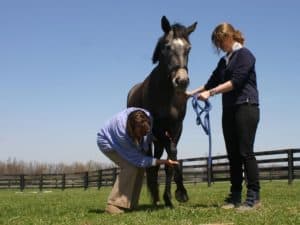Moving Your Horse Safely
I will be moving my horse from Kansas to Virginia in the near future. What preparations can I make to ensure the health of my horse in transit?
AWith the very mobile population of the United States, this is becoming a very common question of horse owners. You need to decide well in advance of the trip whether you are going to transport your horse by personal trailer or commercial van. The following suggestions apply which-ever mode of transportation you choose.
The preparations for long distance transportation should start a minimum of two months in advance. Why so long? Because vaccination, deworming, general health care, and acclimatization to trailering all take time.
Is your horse vaccinated for all of the diseases common to Virginia and the East Coast? If not, early planning is essential because most vaccinations require two initial injections, three to six weeks apart. No matter where you are trailering your horse, always find out about needed vaccinations ahead of time from an equine veterinarian in the destination locale. Tetanus, influenza, and herpesvirus vaccines are always a must, and depending upon the time of year, Eastern/Western encephalitis boosters also might be needed. Rabies, Potomac horse fever, and botulism vaccinations also are recommended for shipment to the East Coast. Contrary to popular belief, adult horses as well as foals can become severely ill with botulism
Create a free account with TheHorse.com to view this content.
TheHorse.com is home to thousands of free articles about horse health care. In order to access some of our exclusive free content, you must be signed into TheHorse.com.
Start your free account today!
Already have an account?
and continue reading.

Written by:
Roberta Dwyer, DVM, MS, Dipl. ACVPM
Related Articles
Stay on top of the most recent Horse Health news with












